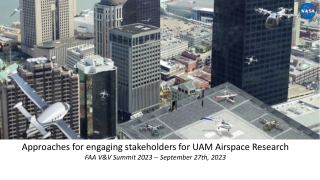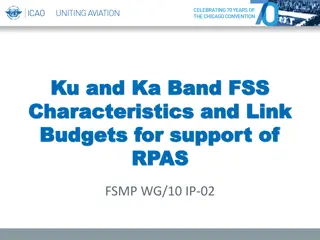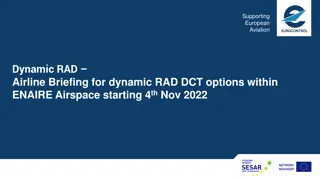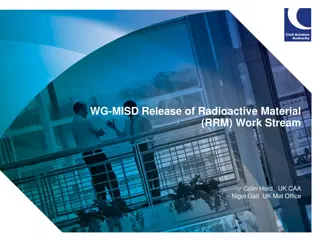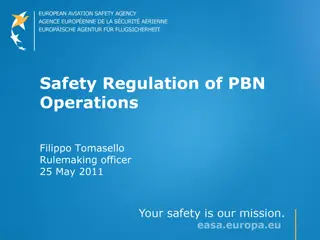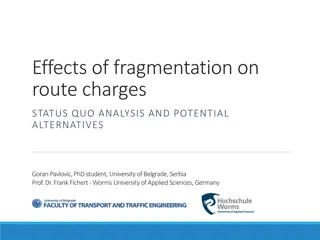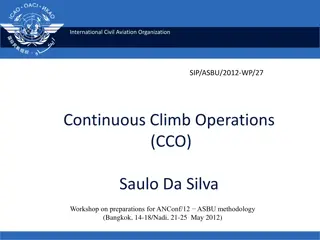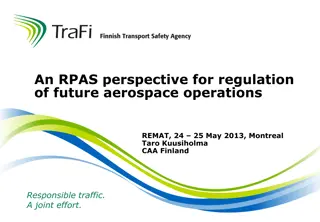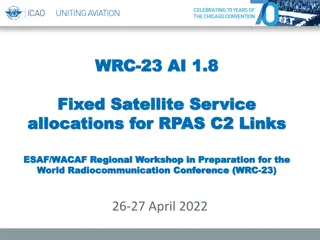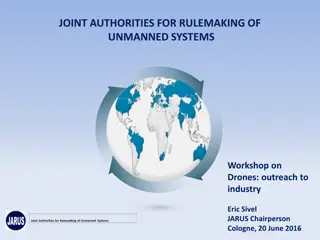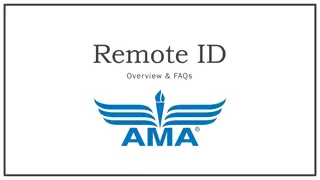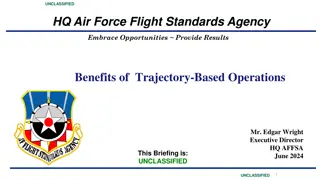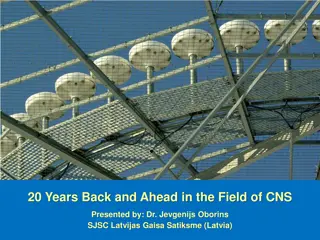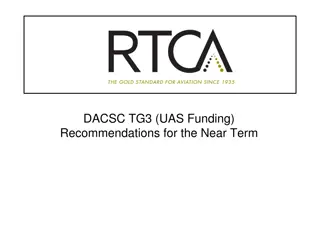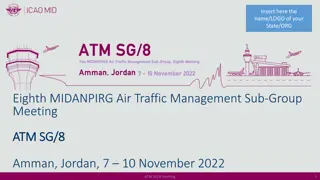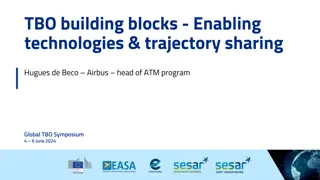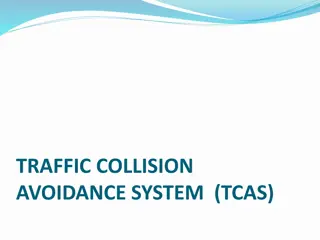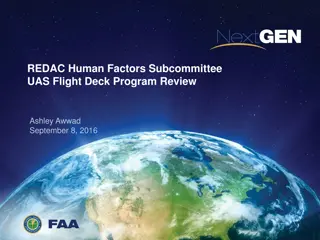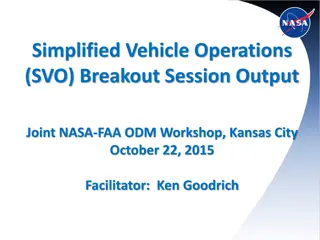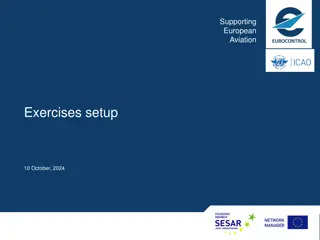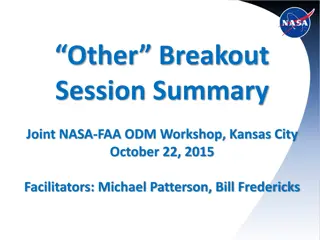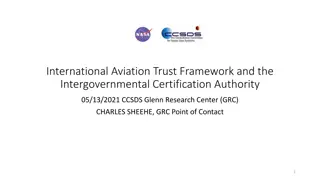Approaches for engaging stakeholders for UAM Airspace Research
The challenges and approaches for engaging stakeholders in UAM airspace research at the FAA V&V Summit 2023. Gain insights into stakeholder convergence and UAM initiatives.
0 views • 13 slides
VFR Arrival Procedures for Total Solar Eclipse Event on April 8, 2024
In preparation for the Total Solar Eclipse event on April 8, 2024, VFR arrival procedures have been outlined including PPR requirements, assigned arrival windows, entry into Class D airspace, monitoring ADSB for traffic, and altitude/speed assignments for different aircraft types. It is crucial to a
5 views • 30 slides
Understanding the Importance of FSS Link Budgets for RPAS Operations
FSS link budgets play a crucial role in ensuring the required performance of C2 links for RPAS operations. They help confirm achievable link performance, define minimum performance values, establish operational and technical boundary conditions, and assess RLP conformity in satellite networks. By de
2 views • 26 slides
Enhancing European Aviation with Dynamic RAD Airline Briefing
Starting from 4th Nov 2022, ENAIRE is trialling Dynamic RAD to provide DCT options within their airspace, optimizing airspace usage and reducing distances for airlines. Objectives include allowing ANSPs to test new restrictions, supporting procedure fine-tuning, and facilitating local assessments. T
0 views • 12 slides
Enhancing Aviation Instruction for Optimal Learning
Explore key areas of adding value to aviation instruction, from theory into practice and maximizing transit time, to debriefing and threat recognition. Discover the importance of lesson planning, practical relevance, airspace management, and effective debriefing techniques. Enhance your teaching app
0 views • 12 slides
Performance Based Navigation (PBN) Benefits for General Aviation
Performance Based Navigation (PBN) offers significant benefits for General Aviation, enhancing operational efficiency, route options, and airspace capacity. Through RNAV and RNP specifications, PBN provides improved on-board alerting and monitoring, potentially reducing reliance on ground-based nava
7 views • 13 slides
Essential Flight Checklists and Airspace Regulations
Explore the key elements of airspace regulations, flight preparation, and checklists for a safe and organized flying experience. Learn about monitoring violations, pre-flight routines, launch procedures, in-flight protocols, and the significance of barometric measurements versus GPS in the aviation
3 views • 15 slides
Enhanced Nuclear Emergency Preparedness Recommendations
Detailed findings and recommendations from exercises on nuclear emergency response in Europe, highlighting the need for improved information, guidance, and contingency planning for aviation stakeholders. Recommendations include developing a comprehensive Concept of Operations for air traffic managem
5 views • 7 slides
Emerging Security Concerns in the Proto-zone: A Closer Look at Airspace Management and Regulation
Contextualizing the evolving challenges in the Proto-zone above commercial airspace, this article delves into the importance of formal consideration by space legal experts. With the rise of technologies like hypersonic transports, stratospheric balloons, and dark sky research stations, there is a gr
0 views • 17 slides
Safety Regulation of PBN Operations Workshop Insights
Safety regulation of performance-based navigation (PBN) operations is crucial for Instrument Rated (IR) pilots to ensure safe and efficient IFR flying. This includes specific requirements and privileges, such as minimum decision heights, airworthiness approval, mature systems, and suitable training
0 views • 24 slides
Impact of Fragmentation on Route Charges in European Airspace
The study analyzes the effects of fragmentation on route charges, focusing on the current route charging system in Europe and the challenges of airport-pair charging. It discusses the negative impacts of detours around charging zones, explores potential alternatives in pricing mechanisms, and addres
0 views • 20 slides
Enhancing Aircraft Efficiency through Continuous Climb Operations (CCO)
The International Civil Aviation Organization (ICAO) conducted workshops on Continuous Climb Operations (CCO) to guide stakeholders like air navigation service providers, aircraft operators, airport operators, and aviation regulators. CCO involves optimizing the aircraft's vertical profile during cl
0 views • 23 slides
Regulation of Future Aerospace Operations from an RPAS Perspective
RPAS, or Remotely Piloted Aircraft Systems, present a wide range of shapes, sizes, and operations that require a comprehensive regulatory framework for safe integration into airspace. The ICAO framework plays a crucial role in addressing the challenges and opportunities associated with RPAS technolo
0 views • 8 slides
Spectrum Allocations for RPAS C2 Links and ITU-R Resolution 155 Status Update
This content delves into the spectrum allocations for RPAS C2 links to facilitate safe operation in non-segregated airspace, covering the background, regulatory considerations, technical aspects, and updates from ITU-R Resolution 155. It highlights the identified frequency allocations for different
0 views • 24 slides
High Altitude Science Flight Operations Report
Critical observations from recent high altitude science flight operations include aircraft limitations, airspace access challenges, scheduling issues, and procedural concerns. Key points highlight the inability of AV-1 to maneuver storms, communication successes during unexpected events, flight fail
0 views • 11 slides
Workshop on Drones: Joint Authorities for Rulemaking of Unmanned Systems
This workshop on drones, led by Eric Sivel, the Chairperson of JARUS, focuses on establishing technical, safety, and operational requirements for certifying and integrating UAS into airspace. JARUS comprises experts from various countries collaborating to recommend guidelines and deliverables toward
0 views • 22 slides
Understanding Remote Identification of Unmanned Aircraft: Compliance Methods
The Final Rule on Remote Identification of Unmanned Aircraft introduces compliance methods for the model aircraft community to fly safely in national airspace. Explore the three ways to comply, including Standard Remote ID, Broadcast Modules, and FAA Recognized Identification Areas. Learn about regi
0 views • 11 slides
Benefits of Trajectory-Based Operations for Military Aircraft
Trajectory-Based Operations (TBO) offer numerous benefits for military aircraft, including flexibility, efficiency, predictability, safety, and cost savings. TBO allows customized trajectories to meet unique operational requirements, reduces fuel consumption and emissions, enhances airspace usage, a
0 views • 7 slides
Aviation Seminar: The Evolution of CNS in European ATM Network
Exploring the past and future of Communication, Navigation, and Surveillance (CNS) in Air Traffic Management (ATM), this presentation delves into the critical role of CNS technologies, including airspace management, air traffic flow, and aeronautical information services. It highlights developments
0 views • 13 slides
Airspace Modernisation at Glasgow Airport: A Strategic Overview
Glasgow Airport Limited is undertaking a major airspace modernisation project to upgrade arrival and departure routes, supported by a long-term development strategy. The initiative aims to meet safety standards, accommodate increased demand, mitigate noise impact, address congestion, enhance airspac
0 views • 20 slides
Emerging Challenges in the Proto-zone and Space Security
The article discusses urgent security concerns in the Proto-zone above commercial airspace, focusing on the need for formal consideration by space legal experts. It explores the increasing applications of stable high-altitude craft in this region and the necessity for Protospace traffic management.
0 views • 17 slides
UAS Funding Recommendations for Successful Integration
The future success of the drone industry relies heavily on government and private sector funding. The DACSC TG3 provides recommendations for near-term funding to support drone integration into the National Airspace System (NAS). Guiding principles prioritize a combination of funding sources and emph
0 views • 20 slides
Eighth MIDANPIRG Air Traffic Management Sub-Group Meeting in Amman, Jordan
The Eighth ATM SG Meeting in Amman, Jordan will discuss follow-up on MIDANPIRG/19 conclusions, planning and implementation issues related to ATM/SAR, air navigation priorities, future work program, and more. Updates on ATM/SAR implementation, airspace enhancements projects, and status of approved Pf
0 views • 4 slides
Global TBO Symposium 2024: Advancing Aviation Technologies
Explore the future of aviation at the Global TBO Symposium 2024 through discussions on enabling technologies, air-ground collaboration, data link for ATC/ATM functions, aircraft operational updates, and safety-critical decision-making processes. Dive into topics like trajectory sharing, dynamic capa
0 views • 4 slides
Understanding TCAS - Traffic Collision Avoidance System
A Traffic Collision Avoidance System (TCAS) is a vital aircraft collision avoidance technology that helps reduce mid-air collisions by monitoring the airspace around an aircraft. TCAS operates independently of ground-based equipment and advises pilots on potential conflicting aircraft. Mandated by t
0 views • 13 slides
UAS Human Factors Research Review
Research review on UAS human factors including Flight Deck program, Minimum Detect and Avoid (DAA), display information, and assessment for en-route contingency operations sponsored by the Federal Aviation Administration. Critical milestones, accomplishments, and future goals highlighted for integra
0 views • 15 slides
Simplified Vehicle Operations Breakout Session Output
Strong agreement on achieving on-demand aviation with little user training. Safety responsibilities distributed between automation, ground systems, and humans. Two paths suggested: direct focus or evolutionary steps, with challenges in training and market growth. Enabling technologies discussed for
0 views • 6 slides
Overview of State A Aviation System
State A's aviation system includes a structured airspace with FIRs, airports, military bases, and training areas. Lack of civil-military coordination poses safety risks. Future considerations involve accommodating traffic growth and expanding airspace for new combat aircraft. The military fleet comp
0 views • 9 slides
ODM Workshop Summary: Joint NASA-FAA Breakout Session
Joint NASA-FAA ODM Workshop held in Kansas City on October 22, 2015, focused on forming roadmap working groups and recommendations in areas like Manufacturing, Integrated Structures, and Community Impact. Key discussions included ODM Airspace Integration for high-density operations and the use of 3-
0 views • 16 slides
International Aviation Trust Framework and the Intergovernmental Certification Authority Overview
The International Aviation Trust Framework (IATF) and the proposed CCSDS Intergovernmental Certification Authority (IGCA) play vital roles in enhancing operations within the airspace domain. The IGCA, as a Policy Root and Issuing CA, aims to be a trusted entity for the space community tied to the de
0 views • 9 slides
